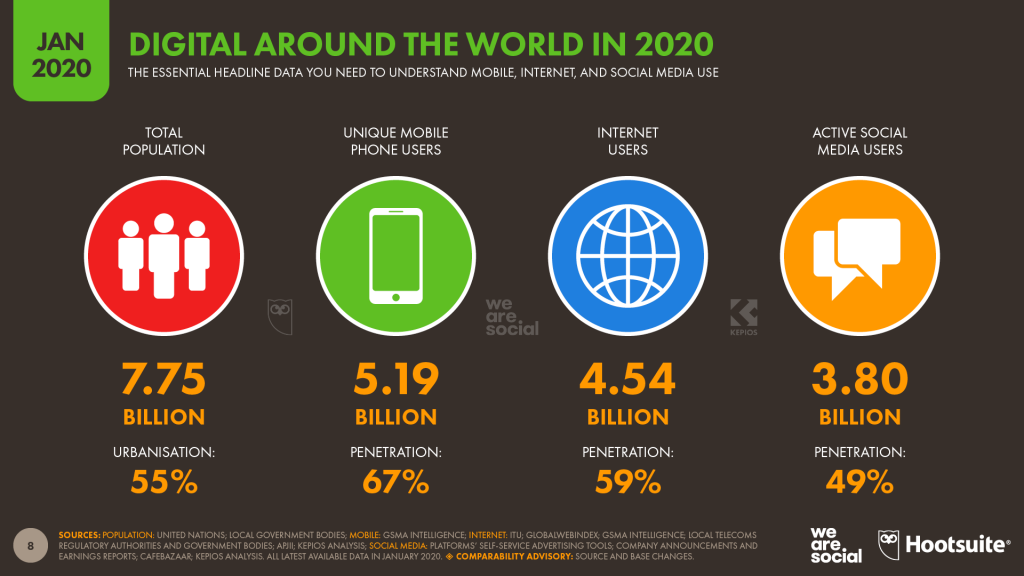When the Indigitous movement was founded in 2013, few others were thinking about digital missions. Some in ministry looked at digital missions with skepticism, while others looked at it as a luxury, something that would be nice to have but was not a priority. Christians looked at their digital life on their phones as being separate from missionary work.
The COVID-19 pandemic has changed that. With the pandemic closing doors to churches, schools, and businesses and keeping much of the world inside their homes, all missions have turned to digital out of necessity. But what really is digital missions?
For starters, it’s something that any follower of Jesus can do. You don’t need to be ordained, work for a church, or work in vocational ministry. If you have faith in Jesus and a phone or a computer, you can be a digital missionary.
Our vision
Digital missions is about bringing the unchanging Gospel to a changing world. Most of the world right now is walking around with smartphones that have more computing power than was used to send astronauts to the moon. Right now, 67% of the world’s population has a mobile phone — that’s more than own a toothbrush — and 59% has internet access. 49% of the world — that’s 3.8 billion — are active social media users.

Jesus called us to “go and make disciples of all nations,” (Matt 28:16) so as Christians, we go where people are to bring them the Gospel. And where are people? Online, on their mobile phones, on social media.
Engaging in digital missions is about bringing the Gospel to those digital spaces. It’s about bringing the Gospel to social media platforms, to people’s email inboxes, to podcasts and YouTube videos, to text messages and Messenger. It’s about doing your part to reach every tongue, every tribe, and every touchscreen.
Getting started
If you’re new to the concept of digital missions, it can seem intimidating. What if you’re not a techie? What if you’re not the “missionary type?” What if you just don’t know how to get started? For those who are new to digital missions, and those who are new to sharing their faith in general, there are some easy ways to get started.
Simple strategies
The Mentor Ministry: Do you have a desire to share the compassion and message of Christ with others without preaching at them? Online mentoring gives you an easy, safe, and anonymous way to learn how to journey with hurting people and to share the Gospel as the Holy Spirit leads. It’s as easy as responding to emails and all online mentors receive training and guidance to help through the process. The Director of the Life Project even calls The Mentor Ministry “evangelism training wheels,” so this is a great way to get started.
EveryStudent.com: EveryStudent is a website designed as a safe place to explore questions about God. Helpful for anyone who has questions about God, not just students, the website has a large collection of topical articles that are easy to share with anyone who is seeking answers. The Make Jesus Findable section on EveryStudent.info also has a variety of ready-to-use resources and tips for using ES content to make Jesus known. This is a great resource for topical content that you can share on social media or via text to start spiritual conversations.
Social media: Social media is perhaps the easiest tool to use for digital missions, because it’s something you’re already using for other purposes. With some prayer and intentional strategy, you can use that social media time to make Jesus known. To help, here are two guides.
Digital Outreach: Digital Outreach events are about training Christians to use social media and other tools at their fingertips to start faith conversations and share the Gospel with their friends and family. Right now we’re putting a special emphasis on Digital Outreach for the GO 2020 campaign. Whether you do Digital Outreach as an organized event or by yourself, it’s an easy and transferable way to engage in digital missions.
Key apps
Christians have long used tracts to convey information and start Gospel conversations, but that technique is outdated. The people you interact with are used to engaging with content on their phone, not a folded piece of paper. Plus, apps are more interactive and can help you as the sharer in a variety of ways. There are a lot of great mobile apps for digital missions, but here are a few that are good starting points.
GodTools: GodTools is an app available in 80+ languages that helps Christians engage anyone in a conversation about Jesus by providing tools that clearly communicate how someone begins and grows a relationship with God. Though designed for in-person conversations, GodTools can be used as a guide for any of your spiritual conversations that happen at a distance.
Jesus Film: One of the most compelling ways for someone to meet Jesus is to see him and hear him in their own language. The Jesus Film App has more than 200 full-length movies, short films, miniseries, and film clips translated into more than 1,600 languages.
yesHEis: “Sharing your faith can be difficult. So we’re here to help.” That’s the promise of the yesHEis app, created by CV. The app includes a library of handpicked videos designed for you to share with non-believers. Each video is connected to a Gospel message encouraging your friend to consider a relationship with Jesus. And if your friend responds, CV has teams on standby in 18 countries ready to answer any questions, pray with them, or connect them with a community.
Additional resources
The above recommendations and resources should be enough to get you started in digital missions, but for those who want more, we have you covered. Our blog is a great place to read about strategies, find case studies of digital missions in action, and be inspired by reading what God is doing through digital missions. We have also created an in-depth Ministry From a Distance resource page that includes webinars, additional tools and strategies, and more.



